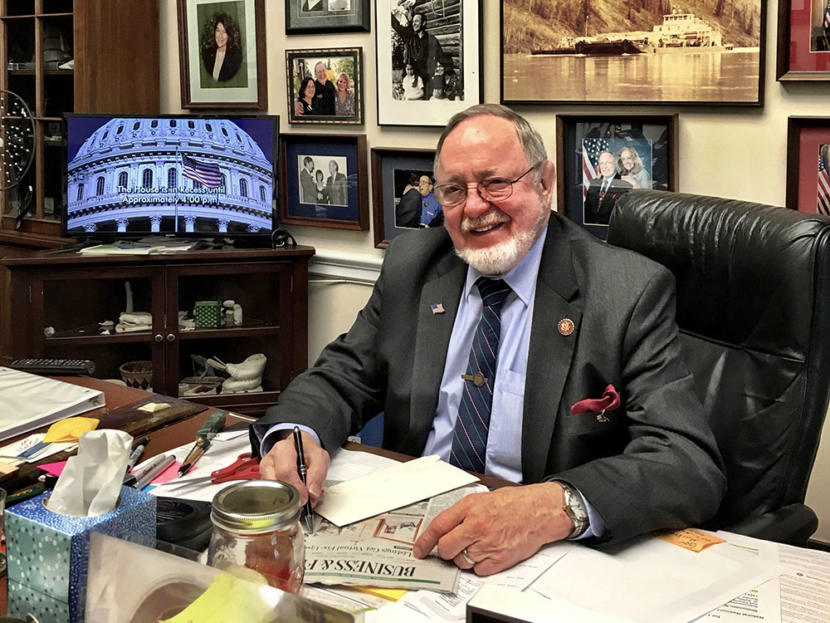
Alaska Congressman Don Young has apologized for shoving a reporter at the U.S. Capitol Thursday. The reporter, Melanie Zanona of Politico, said on Twitter that she and other reporters were interviewing another congressman in the hall and Young shoved her when she was in his way.
Alaska Public Media’s Washington correspondent Liz Ruskin spoke with Alaska Public Media’s Casey Grove about this story:
Casey Grove: Hi, Liz … There are more than a couple ironies in this whole situation. We’ll get to that. First of all, what actually happened?
Liz Ruskin: I contacted the Politico reporter. After she tweeted about the shove, she tweeted again to say that Young had called her and personally apologized and she accepted his apology. She didn’t want to talk to me about it, but I found another reporter who was there:
Arthur Delaney of HuffPost: This small scrum of reporters was partially blocking a doorway that was on the way to the House floor. Members were getting by, but it was a little congested. And then Don Young came through and was pushing on the back of her shoulder and physically moved her a little bit. And he was grumbling something. I couldn’t hear it very well, but I could tell that he was grumbling like, ‘Get out of my way.’
LR: He wasn’t on the way to vote for the Violence Against Women Act, was he?
CG: Liz, Really? Congressman Young was on his way to vote on the Violence Against Women Act when he shoved the reporter?
LR: Yeah. It was one in a vote series, but yeah, he was on his way to vote for the Violence Against Women Act when this incident happened. And that’s irony No. 1. A little irony.
CG: Some of us remember a few years ago there was video of something similar. Young was twisting the arm of a young man who was blocking a Capitol doorway or something. But it does get crowded in the Capitol, right? I mean, how unusual is this?
LR: Reporters do get bumped sometimes. But that witness, Arthur Delaney, he said this did seem odd. Delaney told me that one of the security officers guarding the door to the House chamber noticed it.
Delaney: His eyebrow raised, like ‘That was weird.’ Because it was. It was weird. But (Young) apologized. And that’s important.
LR: And Casey, I have to say Young’s apology came rather quickly.
Don Young has called me to personally apologize, which I accepted and very much appreciate. Told him we were just trying to do our jobs (which he said he understood)! https://t.co/4LHu1xOVGZ
— Melanie Zanona (@MZanona) April 4, 2019
CG: OK. Should we move on to irony No. 2, then?
LR: Right. And that is the vote to renew VAWA, the Violence Against Women Act. Young voted for the bill. He was one of only 33 Republicans who crossed the aisle to vote for it. Most Republicans voted against it. Because the NRA, the National Rifle Association hates this bill. They say any Congress member who votes for it will get a lower score from the NRA, and they’re going to remember come election time.
CG: So they’re keeping score. Why does the NRA hate this? Because it increases the group of people that can’t buy guns or something?
LR: Right. VAWA used to ban gun purchases from domestic abusers who were convicted of felonies. This bill lowers that bar to include lesser crimes. And it also closes what they call the “boyfriend loophole,” meaning that this gun restriction could apply even if the abuser was never married to the victim.
CG: And this is ironic, of course, because Don Young has always been a huge supporter of the NRA, right?
LR: Yes, he’s on the board of directors of the NRA, and he’s defying them by voting for this bill.
CG: Is the NRA going to keep him on the board?
LR: I asked that:
NRA spokesperson Catherine Mortensen: I can’t say specifically to Don Young. I just know that we scored this vote to make crystal clear to members that we view this as a gun-grab bill.
CG: OK, Liz. You said there’s a third irony?
LR: I think so. Among other things, VAWA would create a pilot program to allow up to five tribes in Alaska to prosecute domestic abusers even if the defendant is non-Native.
CG: Is this what people call “Indian country” jurisdiction?
LR: Right. It used to be very controversial, especially among conservatives in Alaska. The idea that tribes could pursue law enforcement against anyone in a geographic area the way a municipality does. And Congressman Young – you might think he would oppose this. But no, he expanded this provision to say that a tribe could have jurisdiction over a village where the population is at least 75% Alaska Natives. This is in a pilot program, so presumably not permanent. But “Indian country” used to be such a hot-button issue, and now it just doesn’t seem to be. So I don’t know if that’s an irony, but it does seem like a change that’s worth noting.
CG: Indeed. Well, Liz, thanks for tracking all this and for being with us here today.
LR: Thank you Casey.
CG: That was Alaska Public Media Washington correspondent Liz Ruskin reporting from the Capitol.
This conversation was lightly edited for clarity.
